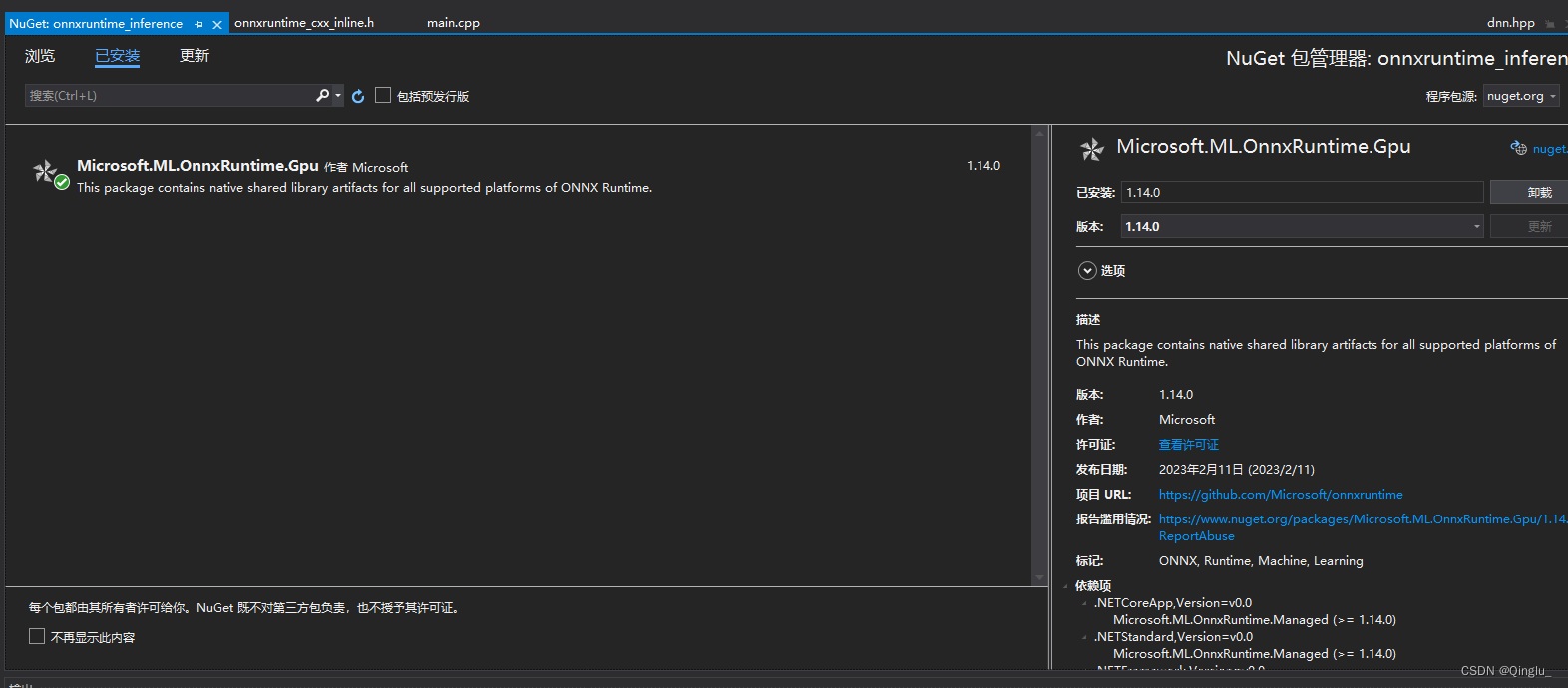目录
【说明】
efficientnetV2是目前基于CNN网络的最强分类模型,我们使用该模型对我们的项目做分类,目前我们使用的是28类,发现其泛化能力比较弱,学习能力是比较强的。
efficientnetV2的pytorch代码是参考的霹雳吧啦Wz大佬的
关于分类的C++推理代码,借鉴了
《C++使用onnxruntime/opencv对onnx模型进行推理(附代码)》
因为有些函数被弃用等,对其也做了一些修改,更方便测试
【步骤】
Ⅰ安装onnxruntime所需要的packages
打开VS2019->创建新项目->项目->管理NuGet程序包->搜索所需要的插件
Ⅱ 等待安装完毕
【代码部分】
#include <opencv2/core.hpp>
#include <opencv2/imgcodecs.hpp>
#include <opencv2/opencv.hpp>
#include <opencv2/highgui.hpp>
#include <opencv2/core/core.hpp>
#include <opencv2/imgproc/imgproc_c.h>
#include <opencv2/dnn.hpp>
#include <opencv2/core/utils/logger.hpp>
#include <iostream>
#include <onnxruntime_cxx_api.h>
#include <assert.h>
#include <vector>
#include <fstream>
using namespace cv; //当定义这一行后,cv::imread可以直接写成imread
using namespace std;
using namespace Ort;
using namespace cv::dnn;
/*******************************************************************************/
//如果使用CUDA加速
#define _CUDA_
//图像的宽和高
#define IMG_H 130
#define IMG_W 130
//种类
#define TOTAL_CATEGORY 28
String labels_txt_file = "H:\\Efficientnet\\onnxruntime_inference\\workspace\\index.txt";
vector<String> readClassNames();
//testDatasets path
const string Path{ "H:\\Efficientnet\\Test_Datasets\\_TN\\_TN1\\_TN (" };
//test label
const string _label_{ "TN1" };
/*如需修改模型的路径和名字,跳转到line104*/
/*******************************************************************************/
// 图像处理 标准化处理
void PreProcess(const Mat& image, Mat& image_blob)
{
Mat input;
image.copyTo(input);
//数据处理 标准化
std::vector<Mat> channels, channel_p;
split(input, channels);
Mat R, G, B;
B = channels.at(0);
G = channels.at(1);
R = channels.at(2);
B = (B / 255. - 0.5) / 0.5;
G = (G / 255. - 0.5) / 0.5;
R = (R / 255. - 0.5) / 0.5;
channel_p.push_back(R);
channel_p.push_back(G);
channel_p.push_back(B);
Mat outt;
merge(channel_p, outt);
image_blob = outt;
}
// 读取txt文件
std::vector<String> readClassNames()
{
std::vector<String> classNames;
std::ifstream fp(labels_txt_file);
if (!fp.is_open())
{
printf("could not open file...\n");
exit(-1);
}
std::string name;
while (!fp.eof())
{
std::getline(fp, name);
if (name.length())
classNames.push_back(name);
}
fp.close();
return classNames;
}
double Total_time{}, Ave_time{};
string label{};
const double _count_ = 44;
int main() // 返回值为整型带参的main函数. 函数体内使用或不使用argc和argv都可
{
float count_error{};
char file_name[50];
//关闭opencv输出的一大堆调试信息
cv::utils::logging::setLogLevel(utils::logging::LOG_LEVEL_SILENT);
//environment (设置为VERBOSE(ORT_LOGGING_LEVEL_VERBOSE)时,方便控制台输出时看到是使用了cpu还是gpu执行)
Ort::Env env(ORT_LOGGING_LEVEL_WARNING, "EfficientModel");
Ort::SessionOptions session_options;
// 使用1个线程执行op,若想提升速度,增加线程数
session_options.SetIntraOpNumThreads(5);
//CUDA加速开启(由于onnxruntime的版本太高,无cuda_provider_factory.h的头文件,加速可以使用onnxruntime V1.8的版本)
#ifdef _CUDA_
OrtSessionOptionsAppendExecutionProvider_CUDA(session_options, 0);
#endif
// ORT_ENABLE_ALL: 启用所有可能的优化
session_options.SetGraphOptimizationLevel(GraphOptimizationLevel::ORT_ENABLE_ALL);
//load model and creat session
#ifdef _WIN32
const wchar_t* model_path = L"H:\\Efficientnet\\onnxruntime_inference\\workspace\\efficient_static.onnx";
#else
const char* model_path = "H:\\Efficientnet\\onnxruntime_inference\\workspace\\efficient_static.onnx";
#endif
printf("Using Onnxruntime C++ API\n");
Ort::Session session(env, model_path, session_options);
// print model input layer (node names, types, shape etc.)
Ort::AllocatorWithDefaultOptions allocator;
//model info
// 获得模型又多少个输入和输出,一般是指对应网络层的数目
// 一般输入只有图像的话input_nodes为1
size_t num_input_nodes = session.GetInputCount();
// 如果是多输出网络,就会是对应输出的数目
size_t num_output_nodes = session.GetOutputCount();
printf("Number of inputs = %zu\n", num_input_nodes);
printf("Number of output = %zu\n", num_output_nodes);
//获取输入name;
//GetInputName和GetOutputName函数由于版本更新无法使用
const char* input_name;
AllocatedStringPtr input_name_Ptr = session.GetInputNameAllocated(0, allocator);
input_name = input_name_Ptr.get();
std::cout << "input_name:" << input_name << std::endl;
//获取输出name
const char* output_name;
AllocatedStringPtr output_name_Ptr = session.GetOutputNameAllocated(0, allocator);
output_name = output_name_Ptr.get();
std::cout << "output_name:" << output_name << std::endl;
//自动获取维度数量
auto input_dims = session.GetInputTypeInfo(0).GetTensorTypeAndShapeInfo().GetShape();
auto output_dims = session.GetOutputTypeInfo(0).GetTensorTypeAndShapeInfo().GetShape();
std::cout << "input_dims:" << input_dims[0] << std::endl;
std::cout << "output_dims:" << output_dims[0] << std::endl;
std::vector<const char*> input_names{ input_name };
std::vector<const char*> output_names = { output_name };
std::vector<const char*> input_node_names = { "input" };
std::vector<const char*> output_node_names = { "output" };
//加载图片
string Str_num{};
string ImgPath{};
for (int i = 1; i <= _count_; i++)
{
Str_num = to_string(i);
ImgPath = Path + Str_num + ").jpg";
Mat img = imread(ImgPath);
//imshow("Image ", img);
Mat det1, det2;
resize(img, det1, Size(IMG_H, IMG_W));
det1.convertTo(det1, CV_32FC3);
//std::cout << det1 << std::endl;
PreProcess(det1, det2); //标准化处理
//imshow("Image ", img);
Mat blob = dnn::blobFromImage(det2, 1., Size(IMG_H, IMG_W), Scalar(0, 0, 0), true, false);
//printf("Load success!\n");
clock_t startTime, endTime ;
//创建输入tensor
auto memory_info = Ort::MemoryInfo::CreateCpu(OrtAllocatorType::OrtArenaAllocator, OrtMemType::OrtMemTypeDefault);
std::vector<Ort::Value> input_tensors;
input_tensors.emplace_back(Ort::Value::CreateTensor<float>(memory_info, blob.ptr<float>(), blob.total(), input_dims.data(), input_dims.size()));
/*cout << int(input_dims.size()) << endl;*/
startTime = clock();
//推理(score model & input tensor, get back output tensor)
auto output_tensors = session.Run(Ort::RunOptions{ nullptr }, input_node_names.data(), input_tensors.data(), input_names.size(), output_node_names.data(), output_names.size());
endTime = clock();
assert(output_tensors.size() == 1 && output_tensors.front().IsTensor());
//除了第一个节点外,其他参数与原网络对应不上程序就会无法执行
//第二个参数代表输入节点的名称集合
//第四个参数1代表输入层的数目
//第五个参数代表输出节点的名称集合
//最后一个参数代表输出节点的数目
//获取输出(Get pointer to output tensor float values)
float* floatarr = output_tensors[0].GetTensorMutableData<float>(); // 也可以使用output_tensors.front(); 获取list中的第一个元素变量 list.pop_front(); 删除list中的第一个位置的元素
// 得到最可能分类输出
Mat newarr = Mat_<double>(1, TOTAL_CATEGORY); //定义一个1*28的矩阵
for (int i = 0; i < newarr.rows; i++)
{
for (int j = 0; j < newarr.cols; j++) //矩阵列数循环
{
newarr.at<double>(i, j) = floatarr[j];
}
}
/*cout << newarr.size() << endl;*/
vector<String> labels = readClassNames();
for (int n = 0; n < newarr.rows; n++) {
Point classNumber;
double classProb;
Mat probMat = newarr(Rect(0, n, TOTAL_CATEGORY, 1)).clone();
Mat result = probMat.reshape(1, 1);
minMaxLoc(result, NULL, &classProb, NULL, &classNumber);
int classidx = classNumber.x;
printf("\n current image classification : %s, possible : %.2f\n", labels.at(classidx).c_str(), classProb);
label = labels.at(classidx).c_str();
// 显示文本
//putText(img, labels.at(classidx), Point(10, 20), FONT_HERSHEY_SIMPLEX, 0.6, Scalar(0, 0, 255), 1, 1);
//imshow("Image Classification", img);
//waitKey(1000);
}
if (label != _label_)
{
//sprintf_s(file_name, "H:\\Efficientnet\\onnxruntime_inference\\error_img\\bmkg\\bm1\\%d.jpg", i);
//imwrite(file_name, img);
count_error += 1;
}
//计算运行时间
std::cout << "The run time is:" << (double)(endTime - startTime) / CLOCKS_PER_SEC << "s" << std::endl;
Total_time += (double)(endTime - startTime);
}
Ave_time = Total_time / _count_;
std::cout << "The Average time is:" << Ave_time <<"ms" << std::endl;
//std:; cout << count_error << std::endl;
std::cout << "Accurate rate:" << ((_count_ - count_error) / _count_) * 100 << "%" << std::endl;
printf("Done!\n");
system("pause");
return 0;
}
【报错问题及解决办法】
① E0135 class “Ort::Session” 没有成员 “GetOutputName”
借鉴下面这位大佬的博客
“GetInputName“: 不是 “Ort::Session“ 的成员
报错的代码,如下:
//获取输入name
const char* input_name = session.GetInputName(0, allocator);
std::cout << "input_name:" << input_name << std::endl;
//获取输出name
const char* output_name = session.GetOutputName(0, allocator);
std::cout << "output_name: " << output_name << std::endl;修改代码:
//获取输入name;
//GetInputName和GetOutputName函数由于版本更新无法使用
const char* input_name;
AllocatedStringPtr input_name_Ptr = session.GetInputNameAllocated(0, allocator);
input_name = input_name_Ptr.get();
std::cout << "input_name:" << input_name << std::endl;
//获取输出name
const char* output_name;
AllocatedStringPtr output_name_Ptr = session.GetInputNameAllocated(0, allocator);
output_name = output_name_Ptr.get();
std::cout << "output_name:" << output_name << std::endl;